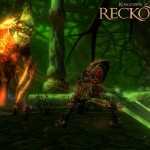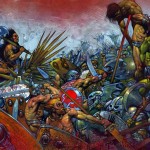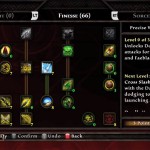Sometime I find myself guilty of procrastination. Who isn’t? Finding thousands of little things to do instead of the one you should be doing? And suddenly your apartment is cleaned up after years of neglect – on finals week. This is why I somehow found time to have a look at the demo for Kingdoms of Amalur: Reckoning. And the demo looked back at me and offered some insights.
Let’s start with the setting and some production background. Because the latter gives context to my criticism on the former. Which is: I don’t feel it. You see, the whole game is allegedly intended to be part of a larger franchise and a kind of proof-of-concept for a larger MMO project. And it seems to have the necessary money behind it, as well as some promising names like Ken Rolston. It’s just… look, I started the game and was greeted with a, well, quite standard RPG intro. The unique point would be that everything somehow is coated in Celtic mythology. Which I find funny, because I did something like that in a student project some years back. And ended up with the same problem that haunts KoA:R. Which is, no one understands the names or will be able to spell them. Or, you know, at least have the option “Subtitles” turned on as default. Really, as non-native speaker I got confused halfway through the intro about the narration. Who was that? Did I just mishear a genuine English word or was that the name of some guy I should supposedly remember? That, combined with the fact that the plot summarizes to “Evil army threatens the world” killed my attention to the setting halfway through the introduction.
Stop me if you heard that one before…
The other thing that amuses me about the setting is, well… see the picture on the right? It’s from Sláine, an 80’s comic based on Celtic mythology. If you do anything with that setting, you will at one time or other reference it. The walls at 38 Studios are probably cluttered with illustrations from that comic and their own concept art. The fun part? Sláine was a contemporary to Warhammer Fantasy. There obviously was something about 80’s Britain that produced a certain mindset of dark and gritty. So, the joke is Tatcherism gave is some of the best works in fantasy and comics ever? Probably, but I like the following timeline more: “An lo! Warhammer met Dune 2 and they begat Warcraft. And Warcraft met Everquest and they begat World of Warcraft. And World of Warcraft met Oblivion and they begat Kingdoms of Amalur. And they all lived in one house and shared their food and continued to beget children with each other.”
What I am trying to say is: It’s only of medium originality, since gamers stewed in that particular setting soup for generations now. Which is not a bad thing, concerning it’s intended mass appeal as MMO. But at least I can no longer muster the necessary excitement that you would want from me if I were to invest in your franchise. Which is the first insight I gained from this game: My comfort zone of “fantasy stuff” is already pretty filled up. And I require new entrants to bring in something new and interesting to the table.
But… is the game any good?
Well, kind of. It’s a weird mixture of MMO and Singleplayer Game, with questing and crafting from the former and combat from the latter. But without other more compelling elements like other players or a unique story. Ok, I could be wrong on the story. It really tries to give you something there. It just felt very disconnected, with no background or context for my character and the far too soon opening up the plotline into generic questing content. But I’ll concede that criticism to the demo and take a final stab at game mechanics.
The game offers the three default classes Warrior, Mage, Rogue and prides itself of its powerful and flexible talent tree and customization system. And the way it works is: There are three trees, and on levelup you choose where to put your points. And there are Destiny Cards that give you a defined class but are only available when you meet their point requirements in every tree. This sounds interesting in concept, but I had problems seeing the interesting choices. The dominant strategy would probably be to pick a single class and put all points in that tree to unlock stronger versions of that class. Most talents give you additional weapon moves. But in combat you are restricted to two weapons anyway, so why should I learn a bit of everything when I am not allowed to put everything into practice? Plus, I did not see any differentiation within each tree. A Warrior is a Warrior, there seem to be no different builds like, for example, Dragon Age where a Warrior could specialize into tanking or damage. I am not sure if such choices are present in Kingdoms of Amalur. Or even worse, if they are false choices, being present but making no differences.
Pavlov’s Rogue
Nevertheless, I had fun while playing. Will probably get it down the line, just to check my assumptions on the talent tree. And find out how powerful that system can get.
And of course I picked the Rogue. Because I want to get all the loot, hide from foes and gain extra experience just for opening doors, and waitaminute…
That is the second insight I gained from this game: I hate missing content. And I hate dying or otherwise losing playing time. Which revealed to me the self-manipulation that hase been going on for years. I have been conditioned by lots of previous RPGs towards a certain playing style (Rogues) in RPGs that does not necessarily bring me the most fun (that honour goes to Mages), but that avoids the most pain. Really, you have all the benefits of extra equipment, damage avoidance and doing something all the time instead of waiting for mana to refill.
Alright, I’ll chew on that another time, the text is already long enough. And, really, I need to check my feelings and have a long talk with Bioware.




